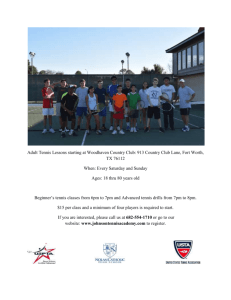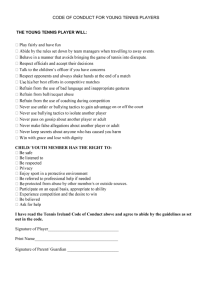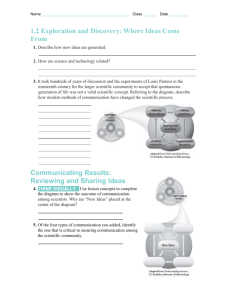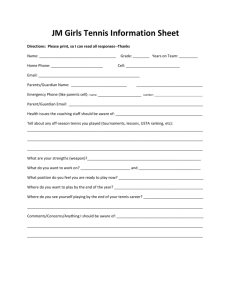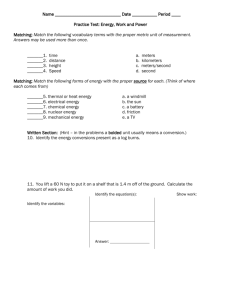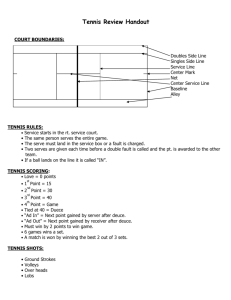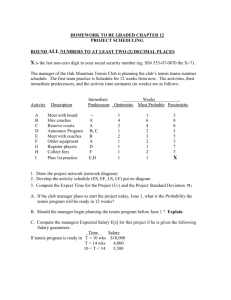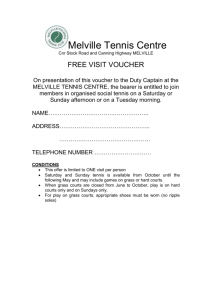Guidelines for Junior Tennis Players
advertisement
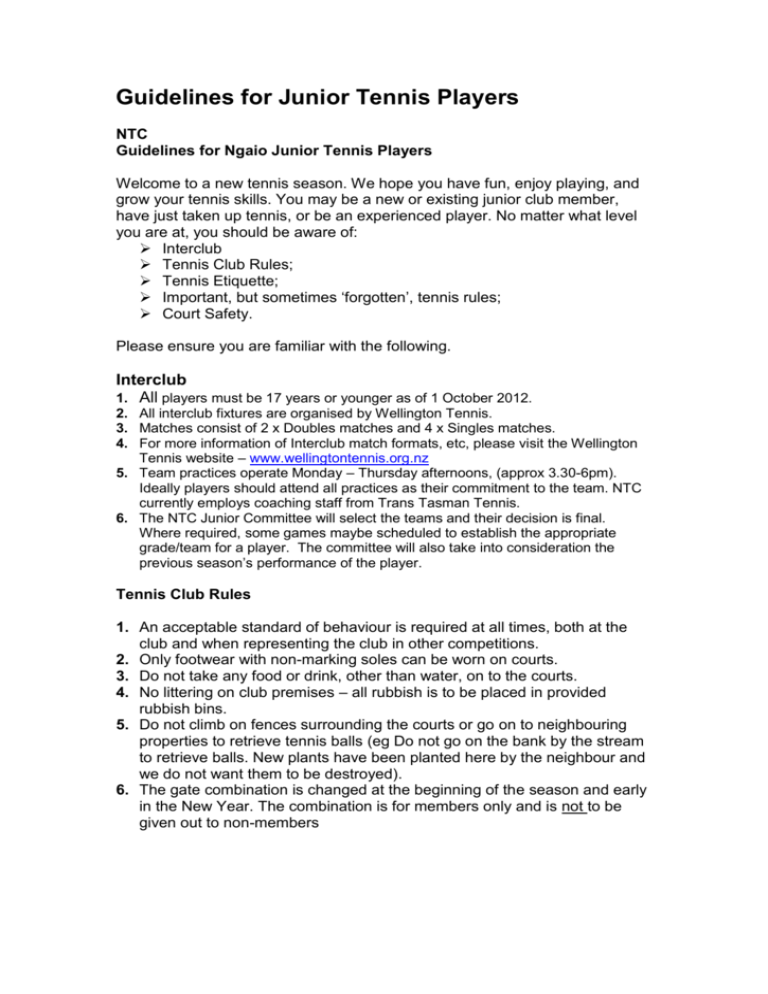
Guidelines for Junior Tennis Players NTC Guidelines for Ngaio Junior Tennis Players Welcome to a new tennis season. We hope you have fun, enjoy playing, and grow your tennis skills. You may be a new or existing junior club member, have just taken up tennis, or be an experienced player. No matter what level you are at, you should be aware of: Interclub Tennis Club Rules; Tennis Etiquette; Important, but sometimes ‘forgotten’, tennis rules; Court Safety. Please ensure you are familiar with the following. Interclub 1. All players must be 17 years or younger as of 1 October 2012. 2. All interclub fixtures are organised by Wellington Tennis. 3. Matches consist of 2 x Doubles matches and 4 x Singles matches. 4. For more information of Interclub match formats, etc, please visit the Wellington Tennis website – www.wellingtontennis.org.nz 5. Team practices operate Monday – Thursday afternoons, (approx 3.30-6pm). Ideally players should attend all practices as their commitment to the team. NTC currently employs coaching staff from Trans Tasman Tennis. 6. The NTC Junior Committee will select the teams and their decision is final. Where required, some games maybe scheduled to establish the appropriate grade/team for a player. The committee will also take into consideration the previous season’s performance of the player. Tennis Club Rules 1. An acceptable standard of behaviour is required at all times, both at the club and when representing the club in other competitions. 2. Only footwear with non-marking soles can be worn on courts. 3. Do not take any food or drink, other than water, on to the courts. 4. No littering on club premises – all rubbish is to be placed in provided rubbish bins. 5. Do not climb on fences surrounding the courts or go on to neighbouring properties to retrieve tennis balls (eg Do not go on the bank by the stream to retrieve balls. New plants have been planted here by the neighbour and we do not want them to be destroyed). 6. The gate combination is changed at the beginning of the season and early in the New Year. The combination is for members only and is not to be given out to non-members Booking a Court To book a court online you will need to apply for a login via the website: http://www.ngaiotennis.co.nz/ then go to the membership tab and click on the appropriate membership type and complete the details. Once processed a login and password will be sent out to you. (note: this may take several days to be sent to you as our site-administrator is a volunteer on the committee). You can now book courts via the website. Simply go to the web address: http://www.ngaiotennis.co.nz/ and click on Court Bookings. It is requested you print out and bring down the confirmation of your booking when you come to the courts to play. Members who have booked a court via the website take precedence over members coming down to play without a booking confirmation. Please note: if there are 4 or fewer of you wishing to play, out of consideration for others, and bearing in mind there are only two courts, please only book one court. If you arrive and find both courts are empty then by all means use. Juniors’ playing rights are from 3 pm to 6 pm weekdays. The courts are booked for junior interclub coaching from Monday – Thursday after school. Non-members: you may bring a non-member along once or twice. After that, the non-member is expected to join the club. Please respect this policy - the courts and facilities are paid for by members for the benefit of members. For non-club organised play, (and excluding bookings that have been made online), a 20-minute playing rule applies when the courts are full i.e. if you are playing and others members arrive, invite them to make up a doubles game if you have been playing singles. Otherwise, the first group on court should cease play 20 minutes after the other members arrive. Tennis Etiquette 1. You must not go behind or on to another court while other players are playing a point (wait until there is a break between points and move quickly across). 2. Introduce yourself to the other player(s) on court before the match. 3. Shake hands and thank the other player(s) for the game at the end of the match. 4. Do not hit the ball back to your opponent if the serve is a fault (hit it into the net or leave it behind your end of the court). 5. The server must call out the score after each point so the opponent can hear it. If you do not hear the score when you are receiving, then ask what it is. This will avoid disputes over the score. 6. Players are responsible for calling all balls on their side of the net. This includes letting your opponent know that they have won the point if: • the ball bounces twice before you hit it; • you hit the ball twice; • you hit the net while playing a point; • you do not play a shot, but touch the ball before it lands inside or outside the court (in doubles this includes touching the ball before your player attempts a shot). • Receiver(s) should clearly call any fault served. If you have a problem with an opponent’s call then you can ask them to confirm it, but always remember that it is their call and you need to abide by it. 7. Quickly return any ball(s) lying at your end of the court to the server at the end of each point. 8. The server should commence the serve when the receiver is ready and not before. 9. Do not do anything to distract your opponent from playing the point (e.g. calling out, talking). 10. Do not use obscene language, slam balls, or throw your racquet Important, but sometimes ‘forgotten’, tennis rules. 1. A ball is good (i.e. “In”) unless you are certain that it fell completely outside the court (or service box when receiving). (NB: The lines are part of the court. A ball, which touches the line, even if by the barest of margins, is in.) If you touch the ball in any way before it lands on the ground outside the court, then you cannot call it out irrespective of whether you are standing inside or outside the court. 2. Clear away any balls / other items lying on your end of the court before commencing a point. Any point lost resulting from them interfering with play will stand. 3. When a ball from another court rolls on the court, you may call a let as soon as you are aware of it, but will lose the right to do this if there is any delay in doing so. Court Safety 1. Remove anything on the court that you could trip on (including loose balls) before commencing a point. 2. When serving, do not place the 2nd ball on the baseline. Wear clothing with pockets or a ball holder so you can keep hold of it. 3. Stay hydrated during a game by regularly drinking water. Keep your water bottle by the net post. 4. Use sun-block and wear a cap.
